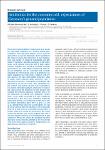Antibiotics for the common cold: expectations of Germany’s general population
Faber, Mirko
Heckenbach, Kirsten
Velasco, Edward
Eckmanns, Tim
Physicians mention patients’ expectations as a reason for prescribing antibiotics for common (viral) upper respiratory tract infections despite clinical evidence against their use and the physicians’ better judgement. We aimed to assess the prevalence of such expectations and factors of influence (knowledge and attitudes) in Germany’s general population. In November 2008, 1,778 persons registered with a large market research company were invited to complete an online questionnaire on expectations concerning prescription of antibiotics and on knowledge and attitudes regarding the effectiveness and use of antibiotics for upper respiratory tract infections. A total of 1,076 persons aged 15–78 years participated (response: 61%), of whom 91.8% reported using antibiotics ‘only if absolutely necessary’. Prescription of antibiotics was expected by 113 (10.5%) of the 1,076 respondents for the common cold and by 997 (92.7%) for pneumonia. In a logistic regression analysis, predictors for expecting a prescription for antibiotics for the common cold included the following opinions: ‘common cold or flu can effectively be treated with antibiotics’ (prevalence: 37.6%; odds ratio (OR): 9.6; 95% confidence interval (CI): 3.8 to 24.3) and ‘antibiotics should be taken when having a sore throat to prevent more serious illness’ (prevalence 8.6%; OR: 7.6; 95% CI: 3.9 to 14.5). Among those expecting a prescription (n=113), 80 (71%) reported that they would trust their physician when he or she deems a prescription unnecessary; a further eight (7%) would be unsatisfied, but would accept the decision. Our results suggest that only a minority expects antibiotics for the treatment of cold symptoms. Physicians should be educated that their decisions not to prescribe antibiotics for the common cold, even when against patients’ expectations, are apparently accepted by the majority.
No license information

